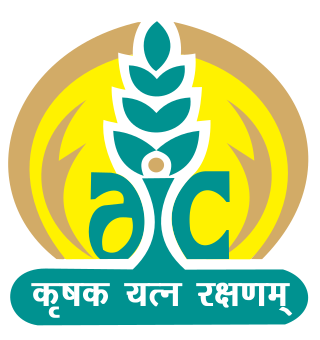Related Research Articles

The Farm Credit Administration is an independent agency of the federal government of the United States. Its function is to regulate the financial institutions that provide credit to farmers.
Crop insurance is insurance purchased by agricultural producers and subsidized by a country's government to protect against either the loss of their crops due to natural disasters, such as hail, drought, and floods, or the loss of revenue due to declines in the prices of agricultural commodities.
Deposit insurance or deposit protection is a measure implemented in many countries to protect bank depositors, in full or in part, from losses caused by a bank's inability to pay its debts when due. Deposit insurance systems are one component of a financial system safety net that promotes financial stability.

The Risk Management Agency (RMA) is an agency of the U.S. Department of Agriculture, which manages the Federal Crop Insurance Corporation (FCIC). The current Administrator is Marcia Bunger.

The National Space Research and Development Agency (NASRDA) is the national space agency of Nigeria. It is a parastatal under Federal Ministry of Innovation, Science and Technology. The agency is based in the Nigerian capital city of Abuja in the Lugbe district and has a ground receiving station, among various other sites. In the past, it has cooperated in space technology with the United Kingdom, China, Ukraine and Russia. The agency has struggled with meeting its financial plans and some of its facilities are rundown. Despite this, the space agency is one of the most advanced space agencies in Africa, boasting of four satellites and very grand ambitions. Nigeria's satellites have been praised for their high-resolution images. NASRDA is host to one of UN-SPIDER's Regional Support Offices (RSO) in Africa.
The Niger Delta Development Commission (NDDC) is a federal government agency established by former Nigerian president Olusegun Obasanjo in the year 2000, with the sole mandate of developing the oil-rich Niger Delta region of Nigeria. In September 2008, President Umaru Yar'Adua announced the formation of a Niger Delta Ministry, with the Niger Delta Development Commission to become a parastatal under the ministry. One of the core mandates of the commission is to train and educate the youths of the oil rich Niger Delta regions to curb hostilities and militancy, while developing key infrastructure to promote economic diversification and productivity.

The Economic and Financial Crimes Commission (EFCC) is a Nigerian law enforcement and anti-graft agency that investigates financial crimes and unknown transactions such as advance fee fraud and money laundering. The EFCC was established in 2003, partially in response to pressure from the Financial Action Task Force on Money Laundering (FATF), which named Nigeria as one of 23 countries non-cooperative in the international community's efforts to fight money laundering. The agency has its head office in Abuja, Nigeria. The EFCC was also set up to fight against corruption and protect the country from economic saboteurs.

Healthcare in Nigeria is a concurrent responsibility of the three tiers of government in the country. Private providers of healthcare have a visible role to play in healthcare delivery. The use of traditional medicine (TM) and complementary and alternative medicine (CAM) has increased significantly over the past few years.

Agriculture Insurance Company of India Limited (AIC) is an Indian public sector undertaking headquartered in New Delhi. It is a government-owned agricultural insurer under ownership of the Ministry of Finance, Government of India.

The Federal Crop Insurance Corporation (FCIC) is a wholly owned government corporation managed by the Risk Management Agency of the United States Department of Agriculture. FCIC manages the federal crop insurance program, which provides U.S. farmers and agricultural entities with crop insurance protection.

Israel–Nigeria relations refers to the bilateral relations between the State of Israel and the Federal Republic of Nigeria. The Nigerian ambassador to Israel is David Oladipo Obasa. The Nigerian government is in collaboration with the Israeli government to bring science, technology and innovation (STI) to the youth of Nigeria in other to reduce the rate of unemployment amongst youth in the nation.

The Nigerian Economic Summit Group (NESG) is a non-profit, non-partisan, private sector organisation with a mandate to promote and champion the reform of the Nigerian economy into a modern, globally competitive, sustainable, inclusive, open economy.
The Federal Ministry of Labour and Employment is the Nigerian Federal Ministry concerned with relations between workers and employers. It is headed by the Minister of Labour and Employment, who is appointed by the President, and is assisted by a Permanent Secretary, who is a career civil servant.

Ajayi Crowther University is a private, faith-based university located in Oyo State, Nigeria.

The Climate Corporation is a digital agriculture company that examines weather, soil and field data to help farmers determine potential yield-limiting factors in their fields.

Responsibility of water supply in Nigeria is shared between three (3) levels of government – federal, state and local. The federal government is in charge of water resources management; state governments have the primary responsibility for urban water supply; and local governments together with communities are responsible for rural water supply. The responsibility for sanitation is not clearly defined.

The Pradhan Mantri fasal bima yojana (PMFBY) launched on 18 February 2016 by Prime Minister Narendra Modi is an insurance service for farmers for their yields. It was formulated in line with One Nation–One Scheme theme by replacing earlier two schemes Agricultural insurance in India#National Agriculture Insurance Scheme and Modified National Agricultural Insurance Scheme by incorporating their best features and removing their inherent drawbacks (shortcomings). It aims to reduce the premium burden on farmers and ensure early settlement of crop assurance claim for the full insured sum.
Leadway Group, also known as Leadway, is a non-banking financial services group of companies headquartered in Lagos, Nigeria. Its flagship company Leadway Assurance Company Ltd, was established in 1970, and has grown to become one of Nigeria's largest insurance firms, recognized for its significant market presence and comprehensive range of insurance products and services. Leadway provides a variety of insurance offerings, including commercial and personal property and casualty insurance, travel insurance, and life insurance.

Natural disasters in Nigeria are mainly related to the climate of Nigeria, which has been reported to cause loss of lives and properties. A natural disaster might be caused by flooding, landslides, and insect infestation, among others. To be classified as a disaster, there is needs to be a profound environmental effect or human loss which must lead to financial loss. This occurrence has become an issue of concern, threatening large populations living in diverse environments in recent years.
References
- ↑ Jeremiah, Urowayino (2024-06-26). "NAIC provides N1.01trn insurance cover to farmers". Vanguard News. Retrieved 2024-12-01.
- ↑ Nigeria, Guardian (2024-05-23). "Government begins process to recapitalise NAIC, NIRSAL". The Guardian Nigeria News - Nigeria and World News. Retrieved 2024-12-01.
- ↑ "history - NAIC". 2023-07-17. Retrieved 2024-12-01.
- ↑ George, Godfrey (2024-11-10). "How livestock insurance can empower Northern Nigerian women farmers". Punch Newspapers. Retrieved 2024-12-01.
- ↑ Bolaji, Nduka Chiejina, Abuja, Sarah (2024-06-25). "NAIC insures ₦1.014tr in agricultural projects in five years". The Nation Newspaper. Retrieved 2024-12-01.
{{cite web}}: CS1 maint: multiple names: authors list (link)